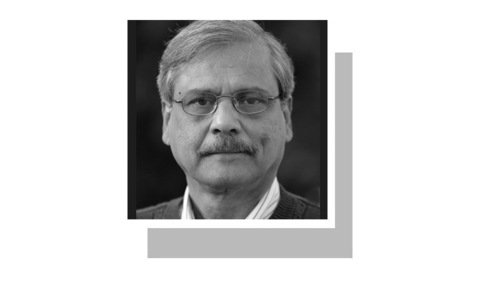HYDERABAD: In the resolutions adopted at a conference ‘Save Sindh’s National Resources and Secular Identity’ held on Sunday, the participants called for withdrawing the plan to amend Irsa Act and shelving the six-canal project designed over Indus River.
Land should be distributed among landless peasants instead of using for corporate farming to end jagirdari system; Water Accord of 1991 should be implemented and new command area development project should be dropped while 10MAF water be released Kotri downstream, they demanded at the event held by the Porhiyat Mazahamat Tehrik at the local press club.
A new pact should be signed between Punjab and Sindh in the light of 1945 agreement and international principles, and culprits of the Dr Shah Nawaz case should be brought to justice, they added.
Lambasting the canals project, the speakers on the occasion said it was aimed at establishing another kind of ‘One Unit’ to stomach farmlands in the name of Green Pakistan Initiative.
They called for putting an end to conspiracies hatched to render Sindh barren and make Punjab green.
‘Save Sindh’s National Resources and Secular Identity’ also calls for justice in Dr Shahnawaz case
Tehreek president Masroor Shah said that building more canals over Indus River and amending Irsa Act was tantamount to doing away with the existence of Sindh. Similarly, he said, the murder of Dr Shahnawaz Kunbhar was an attempt to eliminate Sindh’s centuries-old “secular identity”.
He said lands were allotted to private companies and powerful quarters in the name of corporate farming and now a robbery was being committed over Indus River to irrigate those lands.
He said that through the illegal exercise of presidential powers and transfer of provinces’ powers delegated under the act to the federation, the Irsa Act amendments were proposed to violate Water Accord 1991.
He said while the matter of controversial canals project was pending before the Council of Common Interests (CCI), the same was okayed by Central Development Working Party (CDWP).
“We consider this as new One Unit for Sindh,” he remarked.
Jeay Sindh Mahaz chairman Abdul Khaliq Junejo said water issue was political and not technical.
He said the plan was being made to irrigate Punjab’s desert and render Sindh’s agricultural lands barren, adding that all lands to be cultivated would be controlled by the powerful quarters of the country.
Punjab did not implement even its own accord of 1991 although it was rejected by Sindh. But the situation was so worse that even the accord’s implementation was being sought in Sindh.
He said political parties did not play their role in Dr Shahnawaz case.
A development sector expert, Naseer Memon, in his online speech said that Sindh did not get its share of water under Water Accord 1991 and construction of even a single new canal over Indus would be a matter of concern for the people of Sindh. Of the six canals over Indus, Cholistan and Chaubara in Punjab were the matter of serious concern for Sindh, therefore, the discourse should be centered on them.
He said that under the Green Pakistan Initiative, the federal government planned to complete six canals. In 2001, Wapda had started work on Greater Thal Canal (GTC) Phase-I having the discharge of 8,500 cusecs although Water Accord 1991 allocated 5,900 cusecs for it to irrigate areas in Khushab, Bakhar, Layyah and Jhang.
He said Sindh had objected to that canal but Irsa okayed it with three-two vote on May 7, 2002.
Sindh voted against it in Irsa while three members supported it. Sindh Assembly had adopted resolutions against it on Feb 28,2003 and June 19, 2003 on the ground that at the time of accord, the canal was not in existence and it was added in the schedule of 10 daily based allocations.
Now, he explained, Punjab wanted to execute GTC phase-II by developing command area of Thal Canal and Chaubara Branch Canal. He said water, as per plan on paper, for irrigating Cholistan area would be lifted from Sutlej, but eventually it was Indus River water that would be diverted through Chashma-Jhelum and Taunsa-Panjnad link canals to feed that area during low-flow period.
He said that now Indus water would be used for irrigating 4.8m acres of land at the cost of Sindh’s destruction.
Sindh had taken up the matter at the CCI, but its meeting was not held, adding that the process of issuing directives from the presidency must stop, he demanded.
Prof Mushtaq Mirani said the federal government obtained anti-provinces decisions through its members in the NFC and Irsa.
He accused the PPP of becoming facilitator of the federation in all anti-Sindh decisions, including related to water.
Noted analyst Jami Chandio called for a constitutional and legal war for fighting the water case of Sindh.
He claimed that 70pc work on four, out of the six canals had been completed as those were approved during the Gen Musharraf regime while work on the rest would begin now.
“Balochistan sided with Punjab instead of Sindh,” he said.
He said extremism was increasing in Sindh and wondered if political forces could play a strong role in such conditions over water and extremism
Legal expert Sajjad Chandio said a unified struggle was needed to ensure justice in the Dr Shahnawaz case. He added that extremism was being used as a weapon and Shahnawaz’s extrajudicial killing was part of that conspiracy. He said all that was aimed at eliminating Sindh’s secular identity.
Published in Dawn, November 11th, 2024














































Dear visitor, the comments section is undergoing an overhaul and will return soon.